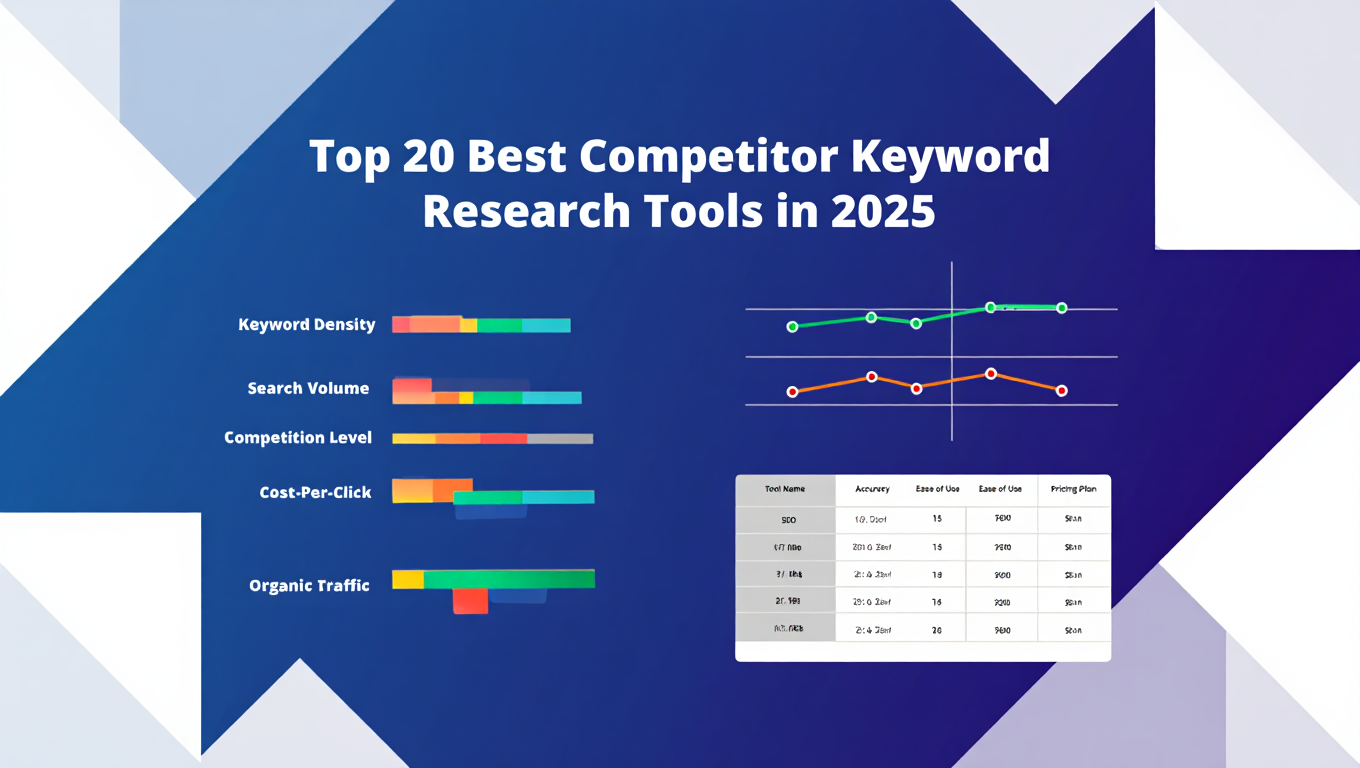If your competitors always seem to outrank you, it’s not luck; it’s data. At Pearl Lemon, we’ve tested dozens of competitor keyword research tools to uncover which ones actually deliver actionable insights. This list is built for SEO agencies, digital marketers, and growth-driven businesses who need to uncover keyword gaps, track trends, and outmanoeuvre their rivals.
According to Ahrefs, over 91% of web pages get zero traffic from Google. The main reason? They’re targeting the wrong keywords or missing critical ones entirely. Meanwhile, a SEMrush study found that 45% of marketers use competitor keyword research to shape their strategy. The difference between ranking and being invisible often comes down to the tool you use.
We’ve done the heavy lifting and handpicked the 20 best competitor keyword research tools for 2025 based on accuracy, depth, pricing, and usability.
What is Competitor Keyword Research?
Competitor keyword research is the process of identifying the search terms your rivals rank for so you can build a smarter strategy. It helps uncover gaps in your content, new traffic opportunities, and insights into your competitors’ SEO strengths and weaknesses.
Businesses that actively monitor competitors’ keywords can increase organic visibility by up to 38% compared to those who don’t. Whether you run an SEO agency or an eCommerce store, knowing what’s working for others gives you a data-backed advantage.
Quick Comparison of the 20 Best Keyword Research Tools
| Tool Name | Best For | Starting Price | Free Trial | Key Feature | Ease of Use | G2 Rating |
| Ahrefs | Deep backlink & keyword data | $99/mo | No | Keyword Gap tool | Medium | 4.7 |
| SEMrush | Comprehensive SEO toolkit | $119.95/mo | Yes | Competitor Positioning Map | Easy | 4.6 |
| SpyFu | Affordable PPC & SEO insights | $39/mo | Yes | Competitor Ad History | Easy | 4.5 |
| Serpstat | All-in-one SEO analysis | $69/mo | Yes | Batch Analysis | Easy | 4.4 |
| Moz Pro | Trusted SEO data | $99/mo | Yes | Keyword Difficulty | Easy | 4.5 |
| Ubersuggest | Budget-friendly research | $29/mo | Yes | Keyword Overview | Easy | 4.3 |
| SE Ranking | SMEs and freelancers | $55/mo | Yes | Competitor Research | Medium | 4.7 |
| SimilarWeb | Market-level insights | Custom | Yes | Traffic Intelligence | Medium | 4.6 |
| Mangools | Simple UI, strong metrics | $49/mo | Yes | SERPChecker | Easy | 4.6 |
| BuzzSumo | Content-driven keywords | $119/mo | Yes | Topic Research | Easy | 4.5 |
| KeywordTool.io | Long-tail keyword research | $69/mo | Yes | Keyword Suggestions | Easy | 4.4 |
| Serpwoo | SERP movement tracking | $49/mo | Yes | Competitor Monitoring | Medium | 4.3 |
| Majestic | Link & keyword correlation | $49.99/mo | No | Trust Flow metric | Medium | 4.2 |
| CognitiveSEO | SEO audits + keywords | $129/mo | Yes | Content Optimization | Medium | 4.4 |
| RankWatch | Keyword gap analysis | $29/mo | Yes | Competitor Insights | Easy | 4.5 |
| WordStream | PPC keyword intel | Free | Free | Competitor PPC Data | Easy | 4.4 |
| GrowthBar | AI + keyword research | $48/mo | Yes | AI Blog Builder | Easy | 4.7 |
| Sistrix | Enterprise SEO monitoring | €99/mo | Yes | Visibility Index | Medium | 4.6 |
| Keyword Insights | Content strategy automation | £49/mo | Yes | Keyword Clustering | Easy | 4.6 |
| ContentKing | Real-time SEO tracking | $49/mo | Yes | Change Monitoring | Easy | 4.5 |
Best 20 Competitor Keyword Research Tools in 2025
Here’s the deep dive into each tool. Who it’s for, key features, pros and cons, and real-world tips to make the most of them.
1. Ahrefs – Keyword & Backlink Powerhouse
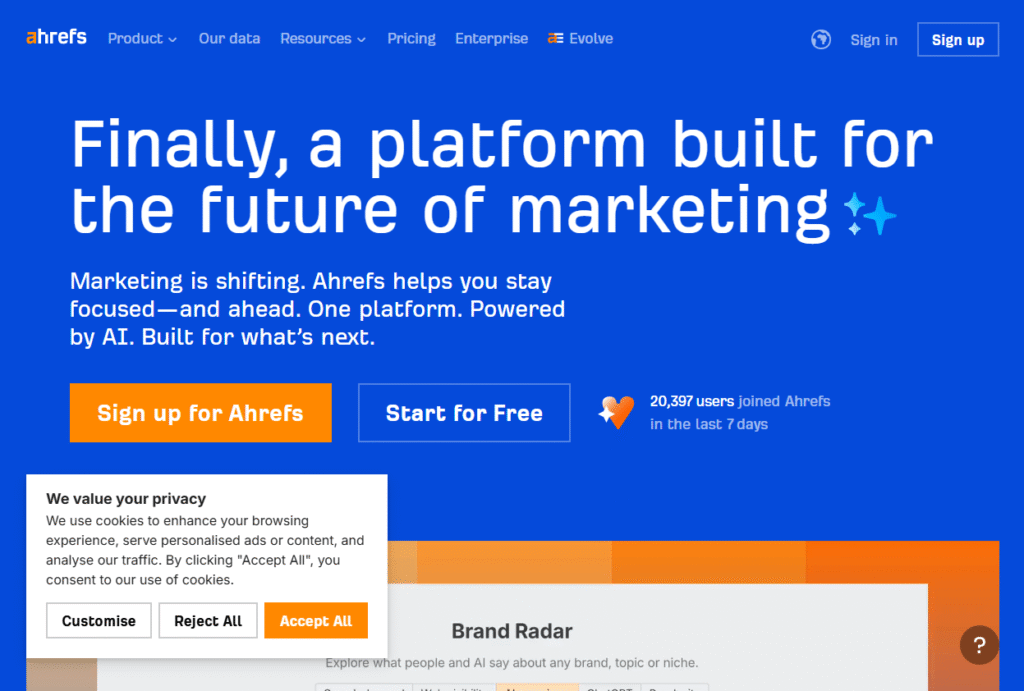
Ahrefs is one of the most trusted competitor keyword research tools used by agencies and marketing teams worldwide. Known for its vast data index and precision, it gives clear visibility into any site’s keyword performance, backlink profile, and content gaps. Many SEO professionals rely on Ahrefs to reverse-engineer their competitors’ strategies and build data-backed campaigns.
Key Features
Keyword Explorer
Ahrefs’ Keyword Explorer provides deep insight into keyword difficulty, click metrics, and parent topics. It helps identify realistic opportunities to outrank competitors without wasting effort on overly competitive phrases.
Site Explorer
This tool gives a detailed breakdown of any domain’s organic traffic, top pages, and backlink sources. It’s particularly effective for identifying which keywords drive the most value for your competitors.
Content Gap Analysis
Ahrefs’ Content Gap feature compares your site’s keyword footprint with that of your top rivals, helping you identify untapped ranking opportunities.
Rank Tracker
The Rank Tracker monitors your position for chosen keywords across locations and devices. You can benchmark progress against multiple competitors.
Backlink Database
Ahrefs maintains one of the largest backlink indexes online, allowing you to study which links support your competitors’ rankings and plan your link acquisition strategy accordingly.
Pros & Cons
| Pros | Cons |
| Comprehensive keyword and backlink data | No free plan |
| Accurate SERP and ranking data | Can feel advanced for beginners |
| Strong competitor comparison tools | Pricey for smaller businesses |
| Reliable historical metrics | Occasional lag in keyword updates |
Pricing
Ahrefs starts at $99 per month for the Lite plan, with higher tiers offering extended limits and advanced reports. Annual billing includes a discount for long-term users.
Best For SEO Agencies and Advanced Marketers
Ahrefs is ideal for agencies and marketers managing multiple client campaigns who need dependable, large-scale data.
- SEO agencies — Accurate competitor data across projects
- Content marketers — Discover keyword gaps for blog growth
- Link builders — Identify high-authority backlink sources
- eCommerce brands — Monitor organic performance against rivals
Verdict: Ahrefs stands out for data accuracy and depth. A lesser-known feature worth using is the Content Gap filter combined with Traffic Value, which highlights competitor keywords that deliver not just traffic, but conversions.
How to Use Ahrefs for Competitor Research
Use the Site Explorer to plug in a rival domain, then filter by “Top Pages by Traffic” to instantly see which pages bring in the most visitors. Pair this with “Best by Links” to understand which assets earn authority and why.
Best Alternate Tool
If you want a lower-cost alternative with user-friendly dashboards, SE Ranking is a practical option offering competitive insights at nearly half the cost.
2. SEMrush – Complete Competitor Analysis Suite
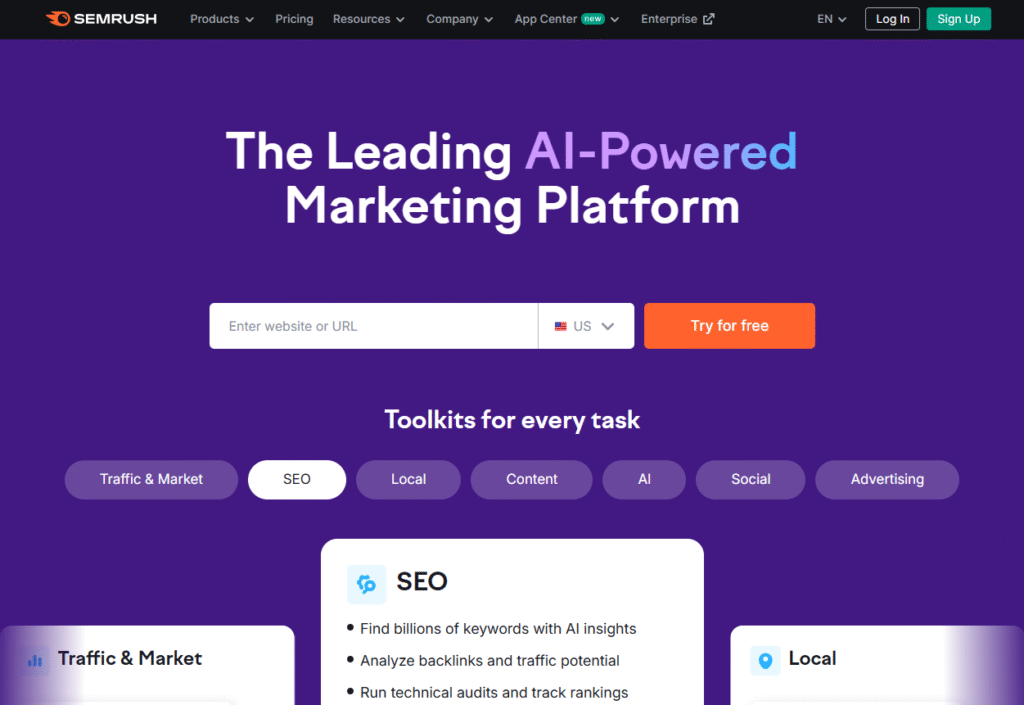
SEMrush is a leading competitor keyword research tool widely used by digital marketing teams, agencies, and SEO consultants. It offers a full suite of SEO, PPC, and content marketing tools, allowing you to track competitors’ keywords, ads, backlinks, and performance across all major search engines.
Key Features
Keyword Gap Tool
SEMrush’s Keyword Gap feature lets you compare up to five domains simultaneously to find missing and overlapping keywords, giving you a clear picture of where your opportunities lie.
Organic Research
This module reveals which keywords drive your competitors’ traffic, their ranking trends, and potential weak spots in their strategy.
Competitor Positioning Map
This visual chart plots you against your competitors based on traffic and keyword count, helping you benchmark your overall visibility.
Domain Overview
A quick overview of any site’s organic and paid search performance, including top-performing keywords, backlinks, and traffic costs.
Advertising Research
SEMrush allows you to view your competitors’ PPC ads, budgets, and keywords to optimise paid campaigns.
Pros & Cons
| Pros | Cons |
| Covers both SEO and PPC data | Pricing can increase with add-ons |
| Excellent keyword and traffic analysis | Interface can feel overwhelming at first |
| Detailed reports for agencies | Some data overlap between modules |
| Strong competitor visualisation tools | Requires regular updates for accuracy |
Pricing
SEMrush pricing starts at $119.95 per month. Plans include Pro, Guru, and Business, each offering higher keyword and domain limits.
Best For Digital Agencies and Growth Marketers
- Marketing agencies — One dashboard for SEO and PPC insights
- PPC managers — Track ad spend and keyword trends
- SEO strategists — Conduct full competitor audits
- Content teams — Find content gaps and keyword clusters
Verdict: SEMrush remains a top-tier choice for comprehensive competitive analysis. A useful hack is to integrate the Keyword Gap Tool with the Position Tracking feature to monitor how quickly you catch up to your top rivals.
How to Use SEMrush for Competitor Research
Enter a rival domain into Organic Research, then export their top keywords and match them with “Keyword Gap” data to find content opportunities.
Best Alternate Tool
SpyFu offers a cost-effective alternative with a stronger focus on ad history and PPC data.
3. SpyFu – PPC and SEO Insight Tracker
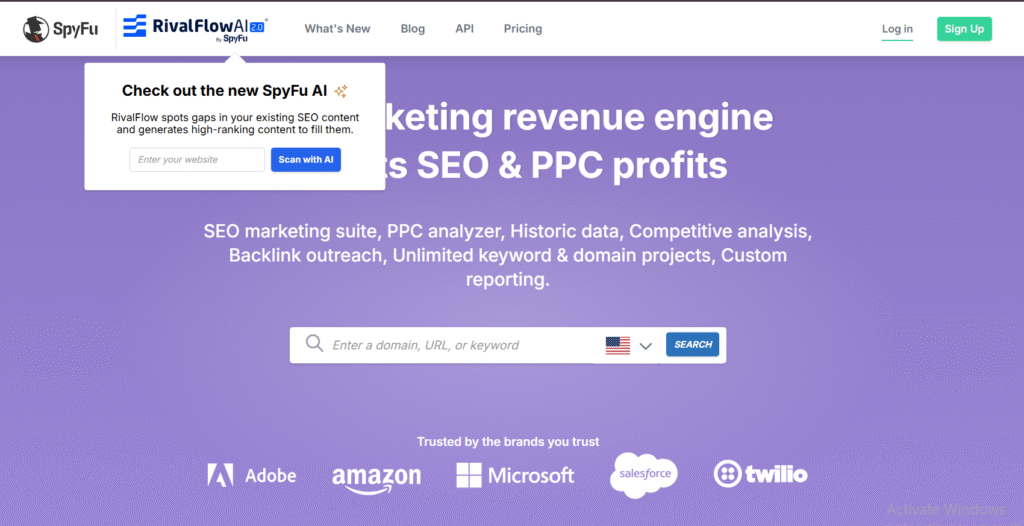
SpyFu is known for its budget-friendly yet powerful approach to keyword and PPC competitor research. It focuses heavily on transparency—showing exactly which keywords your competitors buy, rank for, and drop.
Key Features
Keyword Spy Tool
Gives a direct view of the keywords your competitors are ranking for organically and the ones they’re bidding on in Google Ads.
Ad History
SpyFu stores years of PPC data, letting you see which ad copy and keywords worked over time.
Domain Comparison
Quickly compare up to three competitor domains to find keyword overlaps and missed opportunities.
Keyword Grouping
Automatically groups related terms, helping you structure campaigns or content topics efficiently.
SEO Overview
Provides summaries of keyword positions, ranking trends, and backlink counts for any domain.
Pros & Cons
| Pros | Cons |
| Excellent PPC data coverage | Interface slightly dated |
| Affordable pricing | Lacks deep backlink analytics |
| Long keyword and ad history | Data refresh slower than premium tools |
| Unlimited search results in paid plans | Fewer integrations than SEMrush or Ahrefs |
Pricing
SpyFu plans start at $39 per month, making it one of the most affordable professional-level competitor keyword research tools available.
Best For PPC-Focused Marketers and Small Teams
- PPC specialists — View long-term ad data and CPC changes
- Startups — Access affordable competitor insights
- SEO consultants — Spot quick-win keyword opportunities
- Freelancers — Build low-cost keyword strategies for clients
Verdict: SpyFu’s greatest strength lies in transparency. It helps smaller teams run sophisticated keyword analysis without paying enterprise rates.
How to Use SpyFu for Competitor Research
Use the Ad History view to track which PPC keywords your competitors consistently bid on—it’s a strong signal of profitability.
Best Alternate Tool
Ubersuggest offers a more beginner-friendly interface while still providing keyword insights and domain comparisons.
4. Serpstat – All-in-One SEO and Competitor Analysis
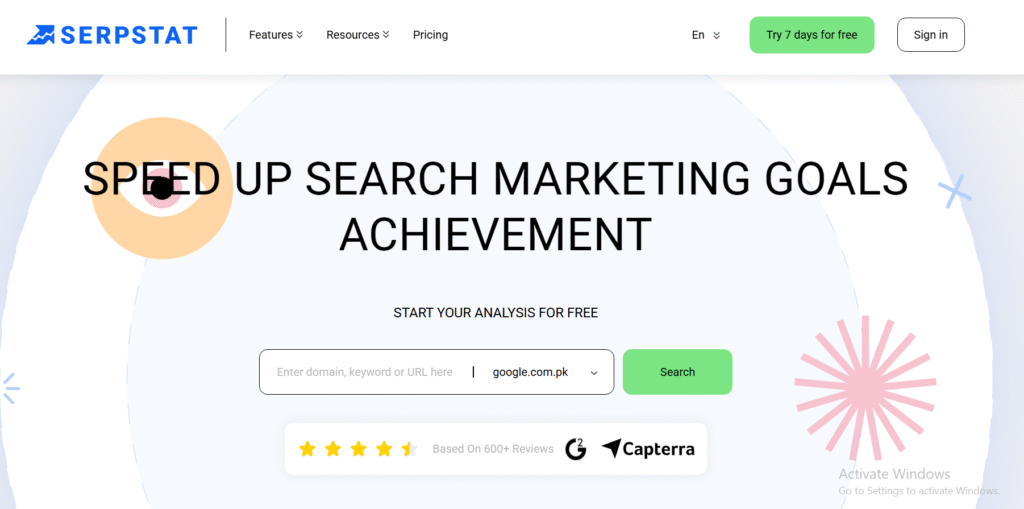
Serpstat is an affordable all-in-one SEO platform that simplifies keyword and competitor research for marketers and agencies. It combines rank tracking, site audits, backlink analysis, and keyword clustering in one tool.
Key Features
Competitor Analysis
Serpstat’s Competitor Graph gives visual comparisons of overlapping and missing keywords between domains.
Batch Analysis
You can upload multiple domains or URLs and receive combined data for keyword, backlink, and ranking stats.
Keyword Clustering
Groups related keywords automatically to support content planning.
Rank Tracker
Tracks performance over time and allows custom competitor tracking per keyword.
Site Audit
Evaluates SEO health, broken links, and on-page issues to complement your keyword data.
Pros & Cons
| Pros | Cons |
| Affordable for small teams | Interface feels less polished |
| Excellent keyword clustering | Fewer integrations |
| Easy domain comparisons | Some keyword data less detailed |
| Good all-in-one tool for beginners | Lacks advanced link filtering |
Pricing
Serpstat pricing starts at $69 per month, with flexible add-ons for larger teams and agencies.
Best For Marketing Teams on a Budget
- SEO freelancers — Conduct competitor audits efficiently
- Small agencies — Access multiple tools in one plan
- Content managers — Plan data-driven content clusters
- Startups — Get affordable all-round SEO insights
Verdict: Serpstat provides solid value with reliable data accuracy for the price. A handy tip is to use its Batch Analysis feature to compare several competitor URLs at once, ideal for spotting micro-content gaps.
How to Use Serpstat for Competitor Research
Run a Domain Analysis, then use Keyword Clustering to group overlapping terms by intent. It makes content planning far more efficient.
Best Alternate Tool
SE Ranking offers more polished reports and simpler UX, making it great for client presentations.
5. Moz Pro – Trusted SEO Keyword and Competitor Data
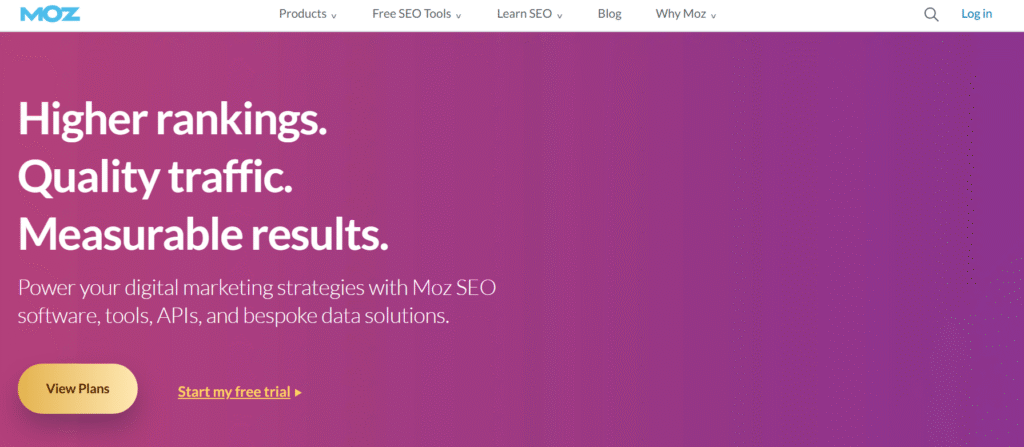
Moz Pro remains a go-to name for those seeking reliable SEO insights and user-friendly keyword research features. It’s built around transparency and education, which makes it accessible even to beginners while still valuable for professionals.
Key Features
Keyword Explorer
Generates keyword ideas with detailed metrics like search volume, opportunity, and difficulty.
Link Explorer
Analyses competitor backlinks, domain authority, and linking domains to guide link-building strategies.
Rank Tracker
Tracks keyword rankings across multiple search engines, helping you measure your progress versus competitors.
Page Optimisation Suggestions
Provides actionable recommendations to improve rankings for target keywords.
Custom Reports
Allows you to automate branded reports—ideal for agencies managing several clients.
Pros & Cons
| Pros | Cons |
| Simple and intuitive interface | Limited keyword database size |
| Reliable Domain Authority metric | Slower data refresh rate |
| Good for beginners and agencies | Lacks PPC insight tools |
| Strong reporting options | Fewer international datasets |
Pricing
Moz Pro starts at $99 per month. Higher-tier plans include additional keyword limits, API access, and advanced reporting.
Best For Growing Agencies and Content Teams
- SEO beginners — Easy learning curve with strong data accuracy
- Agencies — Custom reporting and Domain Authority tracking
- Bloggers — Identify keyword opportunities and gaps
- Businesses — Track growth with automated rank reports
Verdict: Moz Pro balances simplicity with functionality. A great insider tip is to pair Keyword Explorer with Link Explorer, find high-potential keywords and then identify backlink sources your competitors already use.
How to Use Moz Pro for Competitor Research
Start with Keyword Explorer, identify keyword opportunities, and run competitor URLs through Link Explorer to uncover their top linking domains.
Best Alternate Tool
Mangools provides similar functionality with a more visual interface and simpler keyword analysis workflow.
6. Ubersuggest – Budget-Friendly Keyword and Competitor Insights
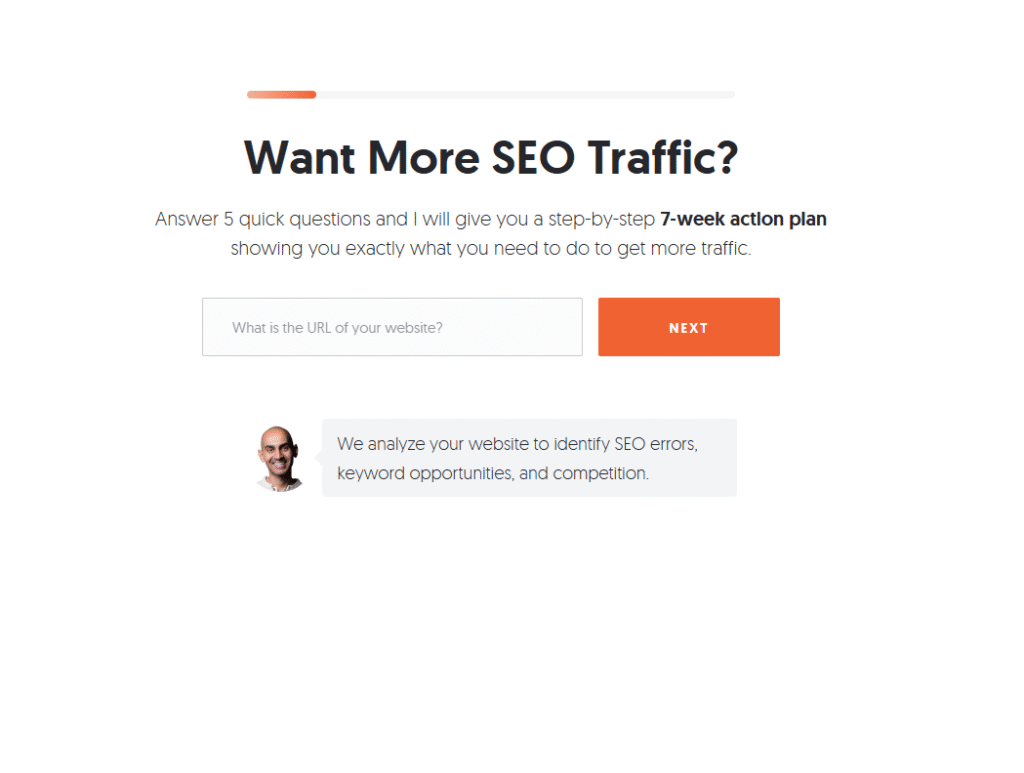
Ubersuggest by Neil Patel is a lightweight and affordable competitor keyword research tool ideal for small businesses, bloggers, and freelancers. It provides straightforward keyword data and competitor comparisons without overwhelming users with complex metrics.
Key Features
Keyword Overview
Displays keyword difficulty, CPC, and seasonal trends, helping you prioritise terms that balance search volume with competition.
Competitor Domain Analysis
Enter a rival domain to uncover its top-ranking keywords, backlinks, and traffic estimates.
Content Ideas
Shows the most popular content for a topic based on engagement and backlinks, helping you spot gaps in your niche.
Backlink Data
Provides insight into where competitors gain backlinks, allowing you to identify outreach opportunities.
Rank Tracking
Monitors your keyword positions against chosen competitors across multiple devices.
Pros & Cons
| Pros | Cons |
| Simple and intuitive interface | Limited data depth compared to premium tools |
| Affordable pricing with free plan | Less accurate for high-volume sites |
| Includes SEO audit and content ideas | Slower keyword update rate |
| Suitable for beginners | No multi-user option |
Pricing
Ubersuggest pricing starts at $29 per month, with a lifetime plan available for a one-time fee.
Best For Freelancers and Small Businesses
- Bloggers — Find low-competition keywords quickly
- Startups — Affordable keyword research and tracking
- SEO beginners — Easy to navigate without technical jargon
- Freelancers — Present keyword opportunities to clients
Verdict: Ubersuggest is perfect for those who want to start keyword and competitor research without spending much. A lesser-known benefit is the lifetime plan, which offers significant long-term savings for consistent users.
How to Use Ubersuggest for Competitor Research
Enter a competitor domain and navigate to Top Pages by Traffic to identify the content bringing the highest organic visits, then replicate similar topics with improved structure.
Best Alternate Tool
RankWatch offers deeper competitor insights and automated keyword gap analysis for a slightly higher cost.
7. SE Ranking – Competitor Research for SMEs and Freelancers
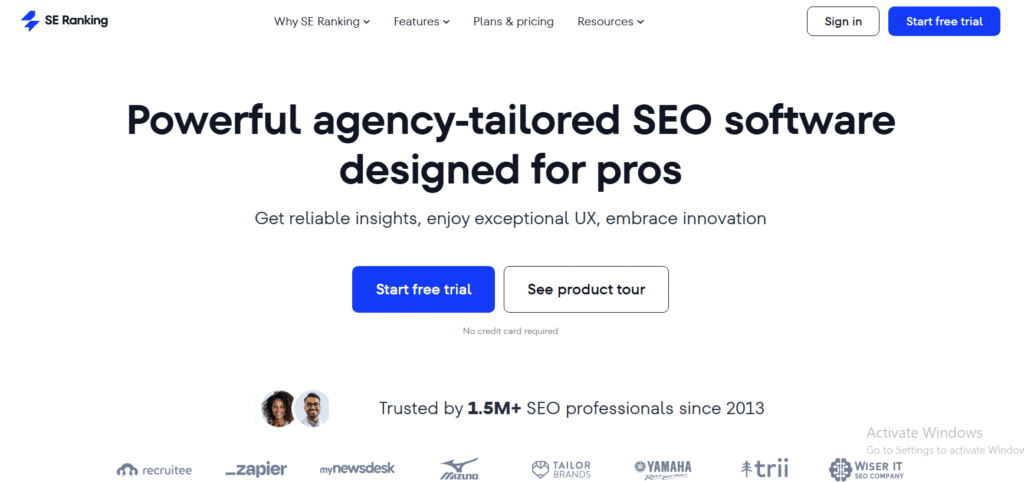
SE Ranking is a well-rounded SEO platform offering strong keyword tracking, competitor monitoring, and backlink analysis. Its user-friendly dashboard and flexible pricing make it a favourite for small and mid-sized businesses.
Key Features
Competitor Research Tool
Shows detailed keyword data, estimated traffic, and paid ads for any domain.
Keyword Rank Tracker
Tracks rankings across multiple search engines, locations, and devices, allowing users to monitor competitors side by side.
Backlink Checker
Scans competitors’ backlink profiles, identifying referring domains and link types.
Marketing Plan
Provides a step-by-step SEO checklist to guide your optimisation efforts.
Website Audit
Evaluates on-page issues and technical SEO errors that could impact rankings.
Pros & Cons
| Pros | Cons |
| User-friendly interface | Limited keyword database for niche regions |
| Affordable monthly plans | Slower backlink updates |
| Flexible pricing by keyword volume | Less suited for large enterprises |
| Great for small agencies | Reporting can be basic |
Pricing
Plans start at $55 per month with options to customise keyword limits and update frequency.
Best For Freelancers and Small Agencies
- Freelancers — Access SEO and keyword tools affordably
- SMEs — Monitor competitors and track rankings easily
- Agencies — Share white-labelled reports with clients
- Content creators — Identify keyword clusters and gaps
Verdict: SE Ranking is an affordable alternative to Ahrefs or SEMrush for users who want solid data without complex setup. Use the Competitor Research and Rank Tracker together for precise monitoring.
How to Use SE Ranking for Competitor Research
Enter a rival domain, open Competitor Research, and export their top keywords. Match these against your tracked list to identify missing keywords that can strengthen your SEO strategy.
Best Alternate Tool
Serpstat offers similar functionality and additional visual keyword clustering.
8. SimilarWeb – Market-Level Competitor Intelligence
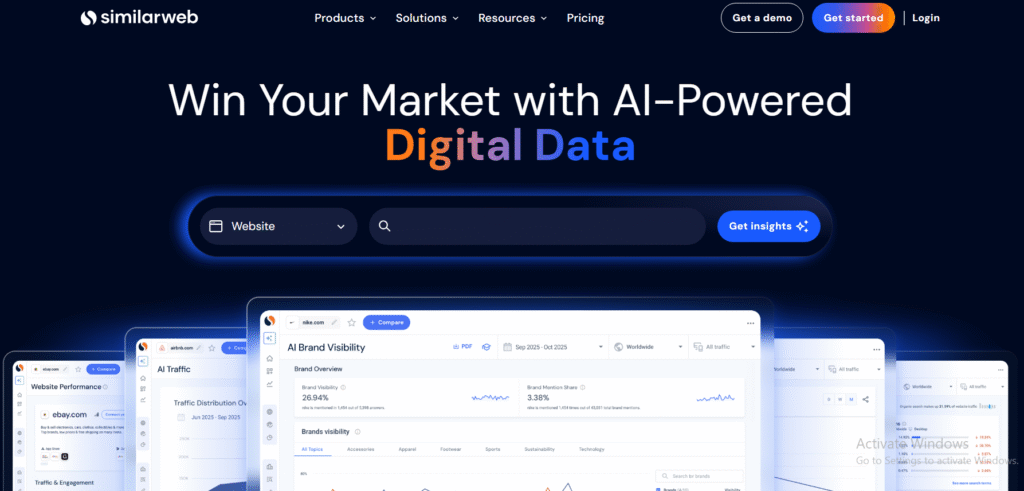
SimilarWeb provides broader market and competitor insights, making it suitable for larger companies and agencies that need to analyse traffic sources, engagement, and keyword performance across industries.
Key Features
Traffic Overview
Displays total visits, engagement metrics, and traffic sources for competitor websites.
Keyword Analysis
Shows top organic and paid keywords driving traffic to a site, revealing both SEO and PPC performance.
Audience Interests
Breaks down user demographics and interests to help shape marketing and content strategies.
Referrals and Top Pages
Identifies referral sites and pages bringing the most traffic to competitors.
Industry Benchmarks
Compares performance across your sector to determine where your business stands.
Pros & Cons
| Pros | Cons |
| Comprehensive market-level data | High pricing for advanced plans |
| Combines organic and paid keyword insights | Data sampling can limit accuracy for small sites |
| Excellent visual reports | Steeper learning curve |
| Ideal for enterprise use | Limited backlink data |
Pricing
SimilarWeb offers custom pricing based on usage, starting with a free version that includes limited insights.
Best For Large Agencies and Enterprise Teams
- Enterprise marketers — View market-level performance and audience overlap
- PPC strategists — Analyse paid keyword traffic trends
- Agencies — Benchmark competitors at scale
- Brand managers — Understand customer interest and referral patterns
Verdict: SimilarWeb is powerful for large-scale competitor research. It’s best used for understanding total traffic distribution and channel performance rather than keyword-level granularity.
How to Use SimilarWeb for Competitor Research
Input your competitor’s domain, navigate to Traffic Overview, and analyse which keywords or sources contribute most to their visits. This helps you prioritise your own traffic acquisition strategies.
Best Alternate Tool
Sistrix offers comparable visibility and detailed keyword tracking, especially for enterprise-level SEO teams.
9. Mangools – Simple Yet Effective SEO Suite
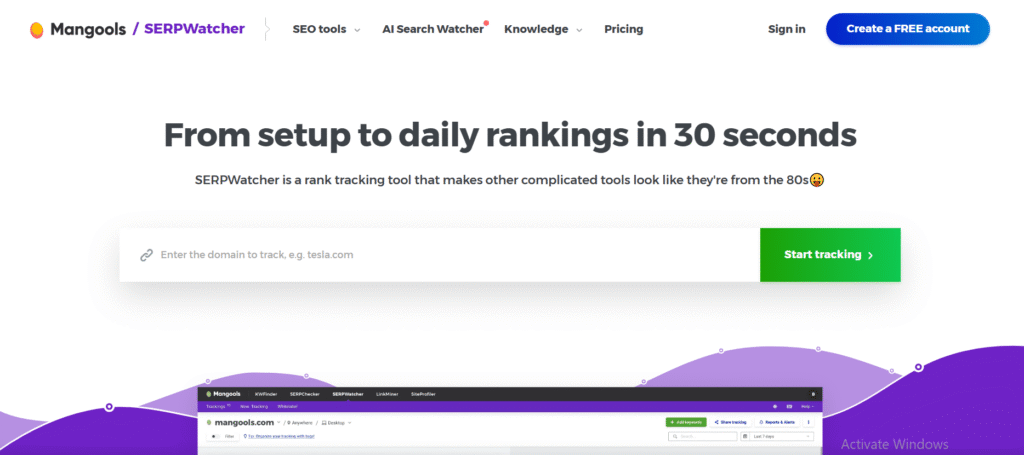
Mangools combines simplicity and functionality, making it perfect for marketers who want essential keyword and competitor data in a clean interface. It includes five tools: KWFinder, SERPChecker, SERPWatcher, LinkMiner, and SiteProfiler.
Key Features
KWFinder
Generates keyword ideas with metrics like search volume, difficulty, and CPC, ideal for identifying low-competition terms.
SERPChecker
Analyses SERPs to show top-ranking pages and domain metrics of competitors.
SERPWatcher
Monitors your ranking changes and visibility index over time.
LinkMiner
Provides insights into competitors’ backlink profiles with metrics such as Citation Flow and Trust Flow.
SiteProfiler
Gives an overview of domain authority, backlinks, and top content pages.
Pros & Cons
| Pros | Cons |
| Simple interface with accurate data | Smaller keyword index |
| Combines several tools in one suite | Lacks deep PPC data |
| Excellent for beginners and small teams | Limited automation features |
| Competitive pricing | Not ideal for enterprise research |
Pricing
Plans start at $49 per month with all five tools included.
Best For Small Teams and SEO Beginners
- Freelancers — Intuitive and affordable SEO toolkit
- Bloggers — Identify long-tail keywords easily
- Agencies — Quick keyword and backlink checks
- Small businesses — Track keyword trends without complexity
Verdict: Mangools is ideal for quick, reliable keyword and competitor checks. Its SERPChecker feature is excellent for identifying content gaps.
How to Use Mangools for Competitor Research
Enter your competitor’s domain into SiteProfiler to see their top content and backlink sources. Use KWFinder to find related terms they may not target.
Best Alternate Tool
Moz Pro offers a more comprehensive ecosystem for users needing advanced reporting and backlink analysis.
10. BuzzSumo – Content-Driven Keyword and Competitor Analysis
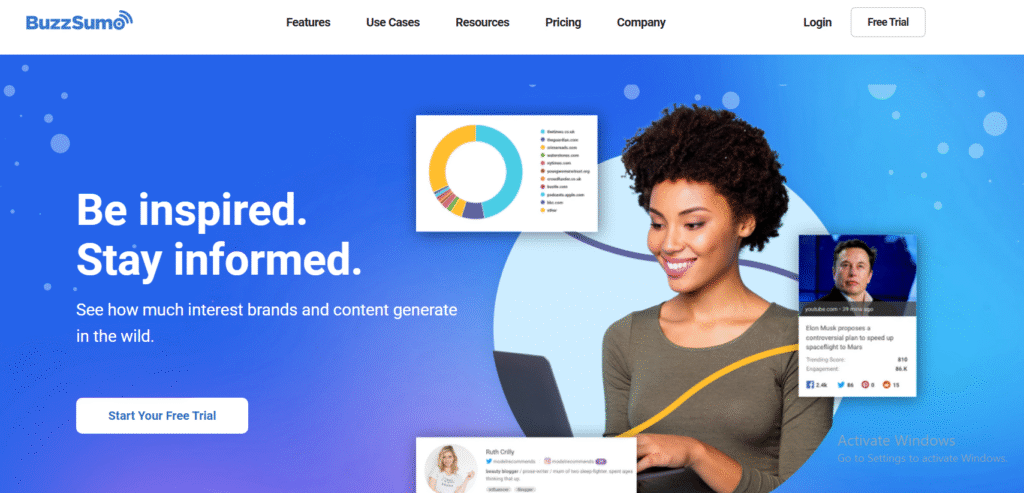
BuzzSumo is best known for identifying high-performing content and trending topics. It’s invaluable for content marketers looking to align keyword research with audience engagement data.
Key Features
Content Research
Finds top-performing articles and posts by engagement and backlinks, revealing keyword patterns that attract attention.
Keyword Discovery
Shows search volume, trend data, and related questions to guide your content strategy.
Competitor Monitoring
Tracks when competitors publish new content and how well it performs.
Influencer Identification
Helps locate authors and influencers driving traffic for competitor content.
Alerts and Mentions
Notifies you when competitors gain new backlinks or social mentions.
Pros & Cons
| Pros | Cons |
| Strong content and engagement insights | Limited traditional SEO data |
| Excellent for topic ideation | Expensive for individual users |
| Real-time alerts and monitoring | No rank tracking |
| Ideal for content-driven teams | Data may lack keyword-level detail |
Pricing
BuzzSumo plans start at $119 per month, with higher tiers offering unlimited alerts and advanced filters.
Best For Content Teams and Digital PR Managers
- Content marketers — Identify winning topics and competitor strategies
- PR teams — Monitor mentions and backlink growth
- Agencies — Discover keyword-driven content ideas
- Bloggers — Align content with trending topics
Verdict: BuzzSumo goes beyond keywords by combining SEO and engagement data. A useful technique is to use Content Research and Keyword Discovery together to plan posts that rank and attract shares.
How to Use BuzzSumo for Competitor Research
Search your main keyword, filter by “Most Shared”, and export data to find which competitor content is performing best across networks.
Best Alternate Tool
KeywordTool.io is a lower-cost option if your focus is strictly keyword suggestions rather than engagement analytics.
11. KeywordTool.io – Long-Tail Keyword and Competitor Suggestions
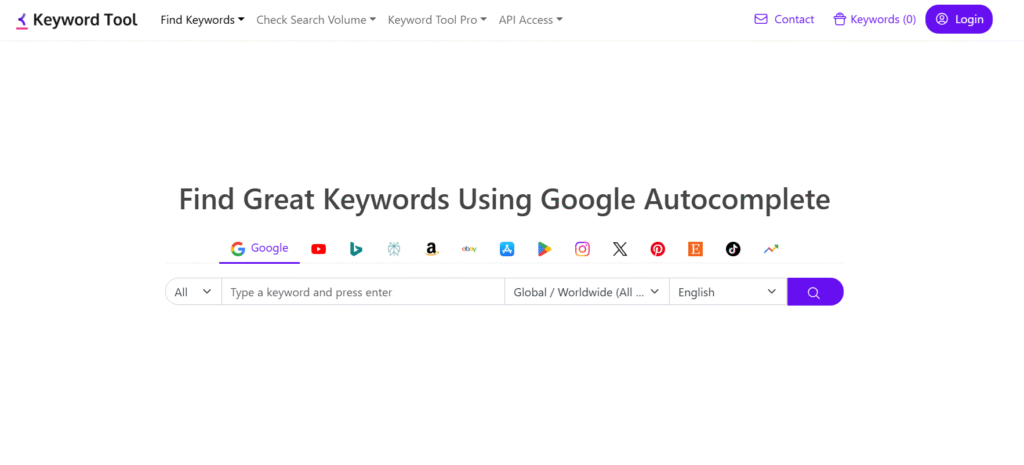
KeywordTool.io is a practical competitor keyword research tool that focuses on generating long-tail keyword ideas. It pulls data from Google Autocomplete, YouTube, Amazon, and other platforms, giving marketers a wider view of potential keyword opportunities beyond traditional SEO tools.
Key Features
Long-Tail Keyword Generator
Produces thousands of keyword suggestions using autocomplete data, making it ideal for identifying low-competition search terms.
Competitor Keyword Lookup
Allows you to enter a competitor’s domain to discover related keyword ideas and ranking opportunities.
Keyword Filtering
Lets you refine results based on language, country, or keyword type for more accurate targeting.
Search Volume and Trend Data
Provides estimated search volumes, CPC, and competition scores for paid users.
Platform-Specific Research
Supports keyword generation for YouTube, Amazon, Bing, and Instagram, helping brands reach different audiences.
Pros & Cons
| Pros | Cons |
| Generates large volumes of keyword ideas | Full metrics locked behind paid plan |
| Supports multiple platforms | No backlink or ranking data |
| Easy to use with fast results | Limited competitor insight depth |
| Great for long-tail keyword discovery | Fewer reporting options |
Pricing
Plans start at $69 per month, with Pro Plus and Pro Business tiers offering more keyword data and filters.
Best For Content Creators and Niche Marketers
- Bloggers — Find unique, low-competition topics
- YouTubers — Identify video keywords for better ranking
- eCommerce sellers — Uncover Amazon keyword trends
- SEO freelancers — Expand keyword lists across industries
Verdict: KeywordTool.io is ideal for uncovering long-tail opportunities your competitors may miss. A great tip is to pair its suggestions with another tool like Ahrefs for verification and deeper keyword intent analysis.
How to Use KeywordTool.io for Competitor Research
Enter a keyword or domain, export the results, and identify gaps that align with your target audience’s search behaviour.
Best Alternate Tool
GrowthBar offers keyword research with AI-driven content generation and ranking insights.
12. Serpwoo – SERP Movement and Competitor Tracking
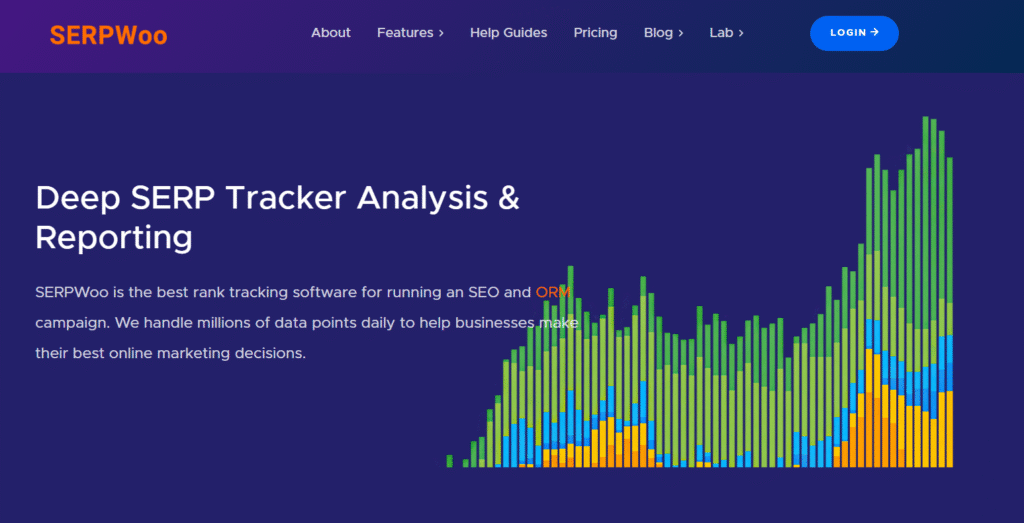
Serpwoo is a niche competitor keyword research tool built for tracking SERP volatility and performance trends. It allows marketers to monitor fluctuations in keyword rankings and understand how competitors move over time.
Key Features
SERP Monitoring
Tracks real-time ranking changes for your keywords and visualises competitor movement across search results.
Project-Based Tracking
Organises keywords into projects, allowing detailed insights per campaign or client.
Competitor Discovery
Automatically detects and lists competitors for tracked keywords.
Historical SERP Data
Shows how rankings evolved over time for any keyword.
API Access
Offers API connectivity for developers and large agencies managing bulk data.
Pros & Cons
| Pros | Cons |
| Excellent for tracking ranking volatility | Limited keyword generation tools |
| Useful for monitoring algorithm changes | Interface can feel outdated |
| Real-time SERP tracking | Smaller keyword database |
| Allows project segmentation | Requires setup time for new users |
Pricing
Serpwoo pricing starts at $49 per month with varying limits based on tracked keywords.
Best For SEO Analysts and Agencies
- SEO professionals — Track ranking shifts in volatile niches
- Agencies — Visualise performance reports for clients
- Digital marketers — Identify ranking trends
- Technical SEOs — Study search engine behaviour patterns
Verdict: Serpwoo is best for professionals who want to understand SERP volatility. Use its SERP Tracking view to see which competitors consistently hold top spots and why.
How to Use Serpwoo for Competitor Research
Track a set of target keywords and analyse the top 10 results over time to identify which competitors are gaining or losing traction.
Best Alternate Tool
CognitiveSEO provides more extensive keyword research with integrated content optimisation tools.
13. Majestic – Link and Keyword Correlation Data
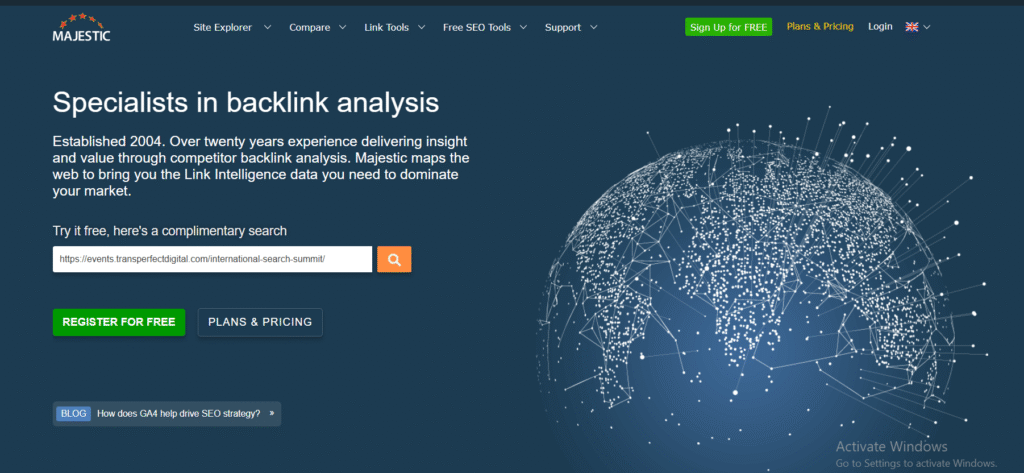
Majestic is primarily a backlink intelligence platform, but it offers valuable competitor keyword insights through link correlation and anchor text analysis. It’s particularly useful for understanding how backlinks influence keyword rankings.
Key Features
Site Explorer
Displays link metrics, referring domains, and top pages for any domain.
Trust Flow and Citation Flow
Majestic’s proprietary metrics measure link quality and quantity to assess domain authority.
Keyword Checker
Shows how often keywords appear in backlinks and anchor text.
Backlink History
Tracks link acquisition and loss trends for your competitors.
Compare Tool
Compares link metrics and keyword anchors across multiple sites.
Pros & Cons
| Pros | Cons |
| Excellent backlink intelligence | No keyword volume or CPC data |
| Accurate Trust Flow metrics | Interface feels technical |
| Strong for off-page analysis | Limited on-page data |
| Great historical link insights | Not ideal for beginners |
Pricing
Plans start at $49.99 per month for the Lite package, scaling up for enterprise needs.
Best For Link Builders and Technical SEOs
- Link builders — Study competitors’ backlink sources
- SEO agencies — Analyse link quality vs. keyword performance
- eCommerce brands — Identify domains worth targeting for outreach
- Digital PR teams — Discover high-authority linking sites
Verdict: Majestic is essential for backlink and keyword anchor research. A good tactic is to analyse competitors’ anchor text to spot which keywords are most frequently linked.
How to Use Majestic for Competitor Research
Enter your competitor’s domain, open Backlink Profile, and sort by anchor text frequency. The most common terms often align with their high-value keywords.
Best Alternate Tool
Ahrefs provides a larger backlink index and additional keyword data.
14. CognitiveSEO – SEO Audit and Content Optimisation Platform
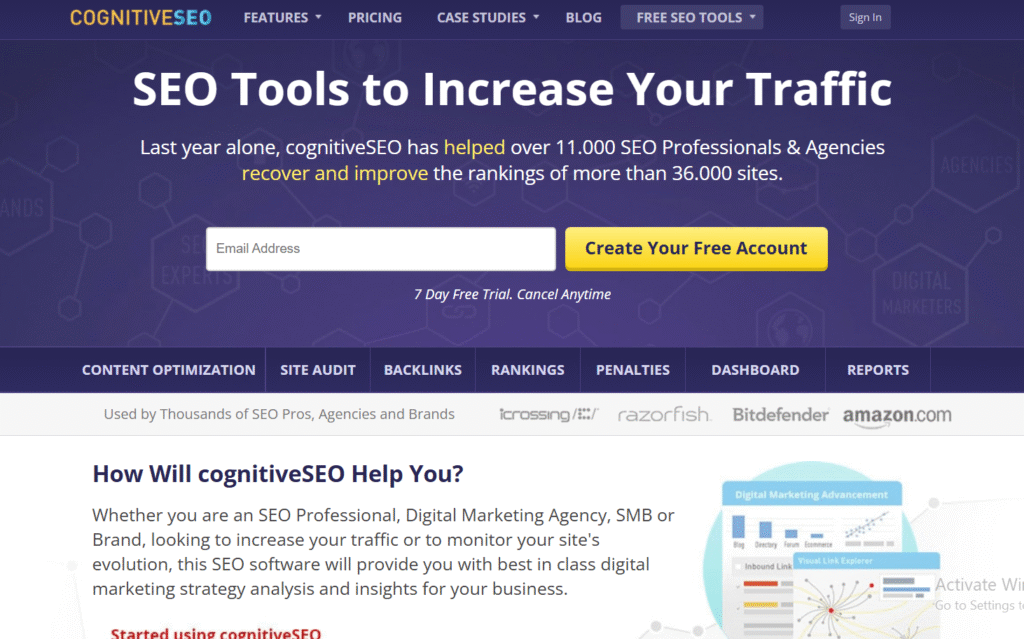
CognitiveSEO combines keyword analysis, content optimisation, and backlink tracking. It’s a well-rounded platform that excels in visualising data and highlighting actionable SEO insights.
Key Features
Content Optimisation Tool
Analyses top-ranking pages for a keyword and suggests terms to include in your content to improve relevance.
Keyword Tool and Explorer
Finds keyword opportunities and measures difficulty and potential traffic.
Unnatural Link Detection
Scans for low-quality backlinks that could affect rankings.
Rank Tracker
Monitors keyword performance and compares progress against competitors.
SEO Audit
Reviews on-page and off-page factors to identify areas for improvement.
Pros & Cons
| Pros | Cons |
| Combines keyword and content optimisation | Pricing higher than entry-level tools |
| Strong link analysis | Interface slightly complex |
| Excellent visual reporting | Learning curve for new users |
| Integrates with Google Analytics | Limited social data features |
Pricing
CognitiveSEO pricing starts at $129 per month, catering mainly to agencies and advanced users.
Best For Agencies and SEO Professionals
- SEO consultants — Optimise on-page content effectively
- Content teams — Use keyword data for content planning
- Agencies — Create visual reports for clients
- Webmasters — Audit site performance with actionable insights
Verdict: CognitiveSEO is great for those focused on quality content and in-depth audits. The Content Optimisation tool is particularly effective for improving keyword density without overstuffing.
How to Use CognitiveSEO for Competitor Research
Run a keyword in Content Optimisation, review the top competitors’ content, and follow the suggested semantic terms to improve your own.
Best Alternate Tool
Serpstat offers similar audit features with more budget-friendly pricing.
15. RankWatch – Competitor Keyword Gap and Ranking Insights
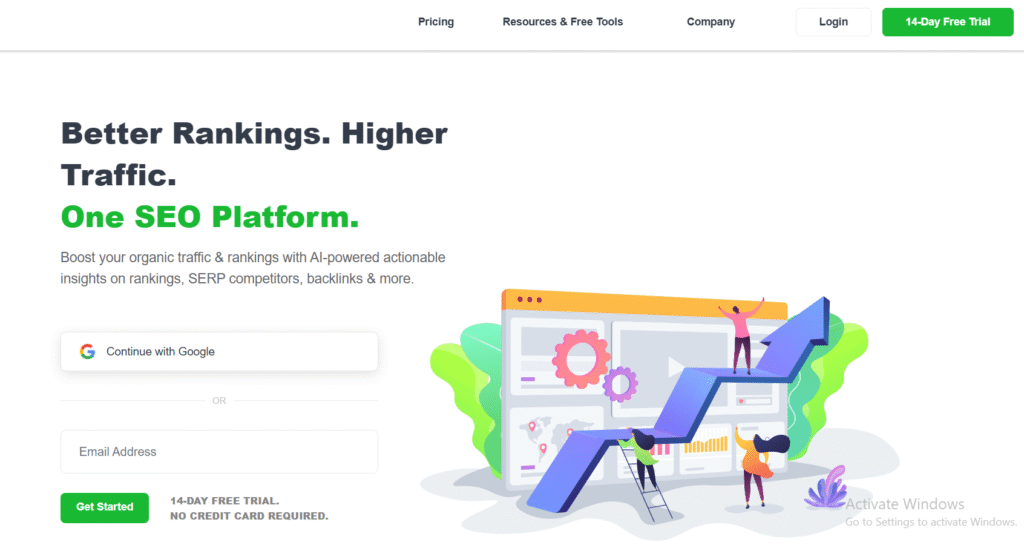
RankWatch offers an affordable way to analyse keyword performance, backlinks, and on-page metrics. It’s known for simplicity and clarity, making it suitable for small businesses and digital marketers.
Key Features
Keyword Gap Tool
Highlights missing keywords your competitors rank for, allowing quick identification of optimisation opportunities.
Rank Tracker
Provides daily keyword position updates and comparisons against competitors.
Backlink Analysis
Shows referring domains, link types, and trust metrics.
Website Audit
Identifies technical SEO errors and areas for site improvement.
Competitor Analysis
Gives a breakdown of keyword overlap, domain strength, and SERP visibility.
Pros & Cons
| Pros | Cons |
| Cost-effective | Limited keyword depth |
| Simple and fast reports | Fewer integrations |
| Customisable dashboards | Smaller backlink database |
| Good automation options | Less data granularity than premium tools |
Pricing
Plans start at $29 per month, with additional discounts for annual billing.
Best For Small Businesses and Entry-Level Marketers
- Startups — Get accessible SEO and keyword data
- Bloggers — Spot keyword and ranking opportunities
- Small agencies — Generate automated competitor reports
- Local businesses — Track local keyword visibility
Verdict: RankWatch is a good starting point for affordable keyword and competitor tracking. The Keyword Gap Tool is its standout feature for spotting missing terms.
How to Use RankWatch for Competitor Research
Add your site and up to five competitor domains, then view the Keyword Gap report to prioritise keywords that can improve your rankings.
Best Alternate Tool
Ubersuggest offers similar affordability with additional content idea functionality.
16. WordStream – Free PPC and Keyword Intelligence
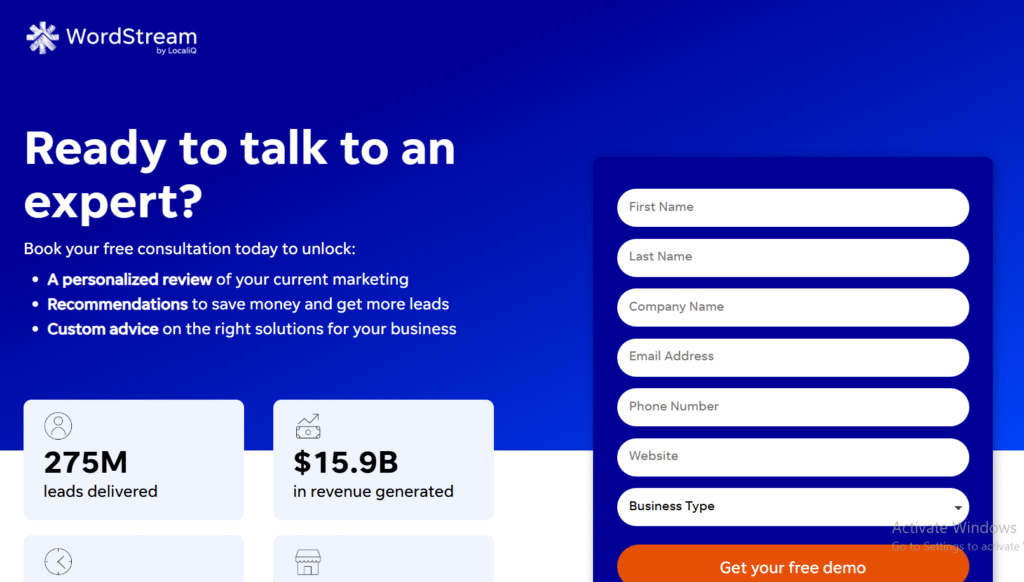
WordStream is designed primarily for PPC keyword insights but also offers useful competitor data for SEO planning. Its simple interface and free tools make it a popular option for small business owners and advertisers looking to optimise campaigns efficiently.
Key Features
Free Keyword Tool
Provides keyword ideas along with search volume, CPC, and competition level to support both SEO and paid campaigns.
Competitor Keyword Analysis
Identifies the keywords your competitors use in ads, allowing you to refine your targeting and budget.
Ad Performance Grader
Evaluates your Google Ads campaigns and compares them against industry benchmarks.
Negative Keyword Suggestions
Highlights irrelevant terms to remove from your campaigns, improving ad spend efficiency.
Industry Benchmarks
Offers insights into average CTR, CPC, and conversion rates for your sector.
Pros & Cons
| Pros | Cons |
| Free keyword and PPC tools | Limited organic keyword data |
| Easy to use for beginners | Lacks backlink analysis |
| Great for paid campaign planning | Not ideal for enterprise use |
| Useful performance grading | Requires account linking for full reports |
Pricing
WordStream offers a free version, while managed PPC software and premium services start with custom pricing based on spend.
Best For PPC Advertisers and Small Businesses
- PPC advertisers — Track and compare ad keywords
- Startups — Use free keyword research tools
- Marketing consultants — Benchmark ad performance
- Local businesses — Identify affordable paid search opportunities
Verdict: WordStream is perfect for quick keyword and PPC insights. The Ad Performance Grader is especially valuable for improving campaign ROI through competitor benchmarking.
How to Use WordStream for Competitor Research
Enter your main keywords or domain in the Free Keyword Tool, then cross-reference with competitor ads to identify high-value terms they’re targeting.
Best Alternate Tool
SpyFu offers more detailed ad history and PPC keyword tracking.
17. GrowthBar – AI-Powered Keyword and Competitor Tool
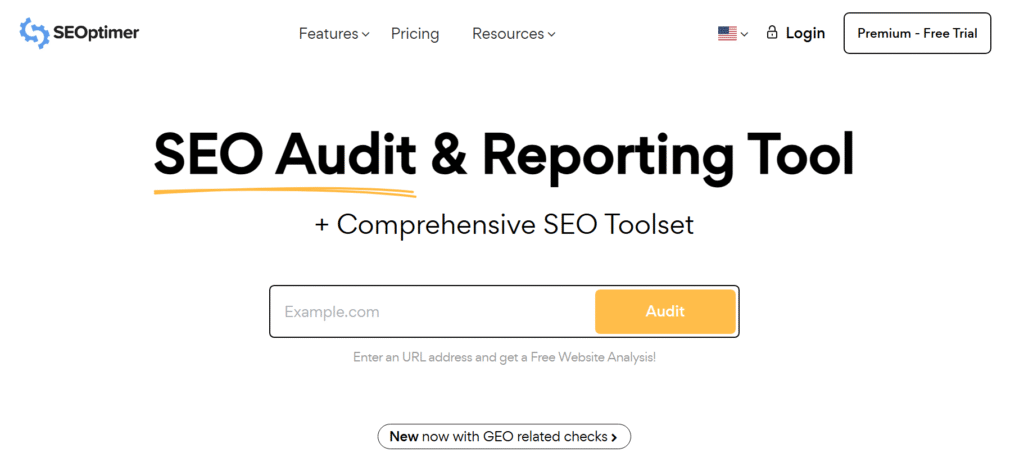
GrowthBar integrates AI-driven keyword research and content creation, helping marketers generate SEO-optimised content while tracking competitor keywords. It’s built for speed and ease, making it suitable for freelancers and agencies.
Key Features
Keyword Research
Shows search volume, competition score, and related terms for SEO and PPC.
AI Content Generator
Creates SEO-friendly outlines and drafts based on top-ranking pages.
Competitor Analysis
Displays a site’s organic traffic, backlinks, and keyword distribution.
Rank Tracking
Tracks your position against competitors in real time.
Chrome Extension
Allows instant keyword data while browsing Google results.
Pros & Cons
| Pros | Cons |
| Combines AI writing with keyword insights | Keyword data less detailed than larger tools |
| Easy-to-use Chrome extension | Limited historical data |
| Affordable pricing | Lacks advanced backlink metrics |
| Great for fast research | No enterprise-level features |
Pricing
GrowthBar pricing begins at $48 per month with flexible monthly and annual plans.
Best For Content Writers and Small Marketing Teams
- Freelancers — Combine writing and keyword research
- Agencies — Generate optimised drafts quickly
- Bloggers — Plan content around real keyword data
- SEO teams — Monitor performance while creating new pages
Verdict: GrowthBar is ideal for content creators who want both keyword insights and AI-powered drafting. Pair it with a backlink tool like Ahrefs for more depth.
How to Use GrowthBar for Competitor Research
Enter a competitor’s domain into Site Inspector to identify their top-ranking pages and related keyword clusters.
Best Alternate Tool
Keyword Insights offers deeper keyword clustering and automation features.
18. Sistrix – Enterprise SEO and Competitor Visibility
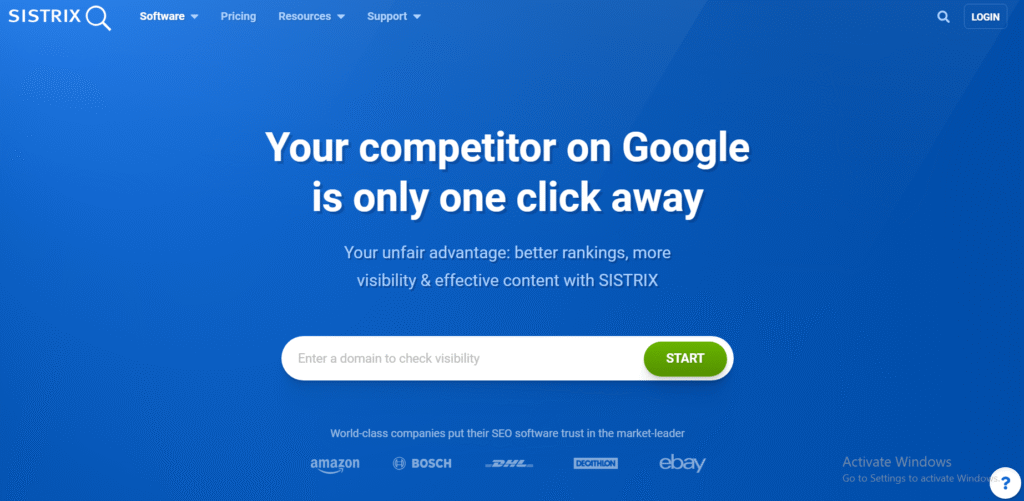
Sistrix is a professional-grade SEO and competitor research tool widely used by large agencies and enterprises. It provides detailed visibility metrics, keyword trends, and domain comparisons, all supported by robust data accuracy.
Key Features
Visibility Index
Sistrix’s proprietary metric tracks overall domain visibility across search results, showing long-term SEO performance.
Keyword Research
Provides ranking data, search volume, and trend history for competitor keywords.
On-Page Analysis
Scans websites for technical and content-related issues affecting visibility.
Backlink Data
Displays referring domains and anchor text for competitors’ link profiles.
SERP Comparison
Compares ranking movement between domains over time.
Pros & Cons
| Pros | Cons |
| Highly accurate visibility tracking | Premium pricing |
| Ideal for enterprise-level SEO | Complex for beginners |
| Great historical keyword data | Limited PPC information |
| Strong competitor comparison tools | Steeper learning curve |
Pricing
Plans start at €99 per month, with custom packages for agencies and enterprises.
Best For Enterprise SEO Teams and Data Analysts
- Enterprise marketers — Track performance at scale
- SEO specialists — Analyse long-term keyword visibility
- Agencies — Benchmark large competitors
- Technical teams — Evaluate SERP behaviour with precision
Verdict: Sistrix is built for those who need precision and scale. Its Visibility Index helps monitor performance trends over months or even years.
How to Use Sistrix for Competitor Research
Run your competitor’s domain through Visibility Index to see ranking trends and keyword gains, then benchmark against your site to identify growth gaps.
Best Alternate Tool
SimilarWeb offers broader market-level insights beyond search visibility.
19. Keyword Insights – Automated Keyword Clustering
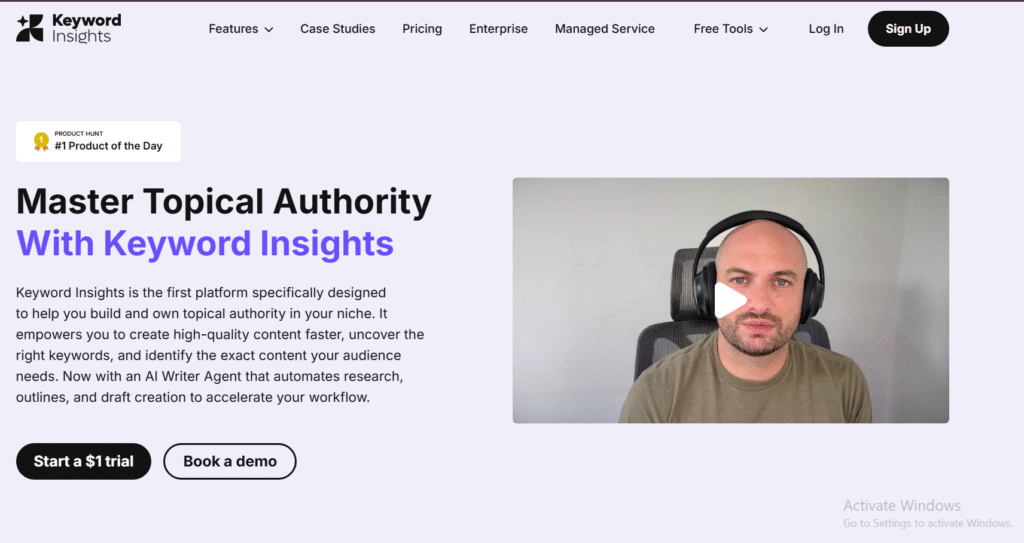
Keyword Insights helps marketers build organised keyword strategies by grouping related terms automatically. It’s ideal for large-scale content planning and competitor gap analysis.
Key Features
Keyword Clustering
Groups similar keywords based on search intent, allowing you to build content silos effectively.
SERP Analysis
Analyses top-ranking pages to understand the types of content Google prefers for each cluster.
Competitor Gap Analysis
Identifies missing keywords that competitors rank for but you don’t.
Search Intent Detection
Categorises keywords by intent—informational, navigational, or transactional.
AI Content Briefs
Creates detailed outlines based on keyword clusters and top-performing competitors.
Pros & Cons
| Pros | Cons |
| Automates large-scale keyword organisation | Relatively new platform |
| Helps plan content by intent | Requires CSV imports for bulk analysis |
| Excellent for agencies managing multiple sites | Lacks backlink data |
| Supports multi-language research | Pricing on higher side for freelancers |
Pricing
Plans begin at £49 per month, scaling with keyword volume.
Best For Content Planners and SEO Strategists
- Agencies — Plan topic clusters efficiently
- SEO strategists — Identify keyword intent and overlap
- Content teams — Build optimised content briefs fast
- Publishers — Manage large content inventories
Verdict: Keyword Insights simplifies keyword management at scale. Use its Intent Detection to prioritise terms aligned with your funnel stage.
How to Use Keyword Insights for Competitor Research
Upload your keyword list and run a SERP Analysis to identify competitors dominating specific topics.
Best Alternate Tool
CognitiveSEO offers similar content guidance with deeper SEO analysis.
20. ContentKing – Real-Time SEO and Competitor Tracking
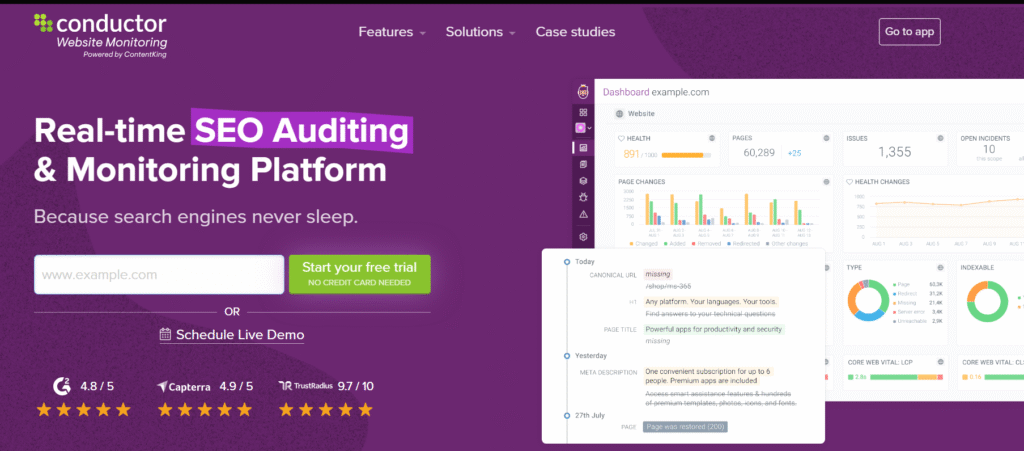
ContentKing offers real-time SEO monitoring and competitor insights. It alerts you to changes that may affect rankings, such as metadata edits, broken links, or content updates.
Key Features
Real-Time Auditing
Monitors your site and competitors continuously for SEO-related changes.
Change Tracking
Logs updates to key on-page elements, allowing you to react to competitor changes instantly.
Page Health Monitoring
Detects broken pages, redirects, and missing tags.
Reporting and Alerts
Sends instant notifications about SEO performance shifts.
Integration Support
Connects with Google Analytics, Search Console, and Slack for seamless monitoring.
Pros & Cons
| Pros | Cons |
| Real-time tracking and alerts | Focused mainly on technical SEO |
| Excellent for large sites | Lacks keyword research depth |
| Continuous auditing | Premium pricing for full features |
| Integrates with major platforms | Limited backlink insights |
Pricing
Plans start at $49 per month, depending on the number of pages monitored.
Best For Agencies and Technical SEO Teams
- Agencies — Monitor multiple client sites continuously
- Technical SEOs — Detect changes affecting rankings instantly
- Large businesses — Track competitor site updates
- Marketing teams — Receive alerts for ranking-impacting issues
Verdict: ContentKing is ideal for those who need continuous insight into site and competitor changes. The Change Tracking tool helps spot competitor updates before they gain ranking advantages.
How to Use ContentKing for Competitor Research
Add competitor URLs to your monitoring list to track title, meta, and content updates that may signal new SEO strategies.
Best Alternate Tool
Screaming Frog offers similar auditing functions for a one-time licence fee.
Final Words
Choosing the best competitor keyword research tool depends on your goals, scale, and budget. Whether you need deep backlink insights, long-tail keyword data, or real-time tracking, each of these twenty tools offers a unique advantage. From Ahrefs and SEMrush for comprehensive analysis to Ubersuggest and RankWatch for affordability, there’s an option to suit every type of marketer.
At Pearl Lemon, we’ve tested them all and can confidently say that using the right competitor keyword research tool can transform how you approach SEO. When you understand what your competitors rank for, how they structure their content, and where they’re gaining traction, you gain the clarity to refine your strategy and move ahead in the rankings.
Get Help With Your SEO Strategy
At Pearl Lemon, we specialise in competitor keyword analysis and strategic SEO campaigns that deliver measurable growth. Our team uses the most accurate tools and proven methodologies to uncover hidden keyword opportunities and design campaigns that consistently outperform competitors.
Whether you run a startup or manage an established brand, we’ll create a strategy tailored to your market and audience.
Schedule a consultation with our team to see how our SEO expertise can position your business for consistent long-term visibility.
FAQs
1. What is a competitor keyword research tool?
It’s a platform that analyses the keywords your competitors rank for, allowing you to discover gaps and new opportunities for your own site.
2. Why is competitor keyword research important?
It helps you identify what drives traffic to rival websites, refine your keyword targeting, and build a strategy that outperforms them.
3. Which tool is best for beginners?
Ubersuggest and Mangools are ideal for beginners because they offer clear dashboards and affordable pricing.
4. Which competitor keyword research tool is best for agencies?
Ahrefs and SEMrush are best for agencies due to their wide feature sets and data reliability.
5. Are free keyword research tools worth using?
Free tools like WordStream are useful for quick checks, but paid platforms provide deeper insights and more accurate data.
6. How often should I conduct competitor keyword research?
Ideally, review competitors quarterly to keep track of ranking shifts and new keyword opportunities.
7. Can competitor keyword tools help with PPC campaigns?
Yes, tools such as SpyFu and SEMrush offer data on competitor ad keywords and spending patterns.
8. What’s the difference between keyword research and competitor research?
Keyword research identifies what people search for, while competitor research shows what others already rank for.
9. How do I find keyword gaps between my site and competitors?
Use Keyword Gap features in tools like Ahrefs, SEMrush, or RankWatch to find missing keywords.
10. What should I look for when choosing a tool?
Focus on accuracy, data depth, reporting features, and whether the pricing suits your project scale.

